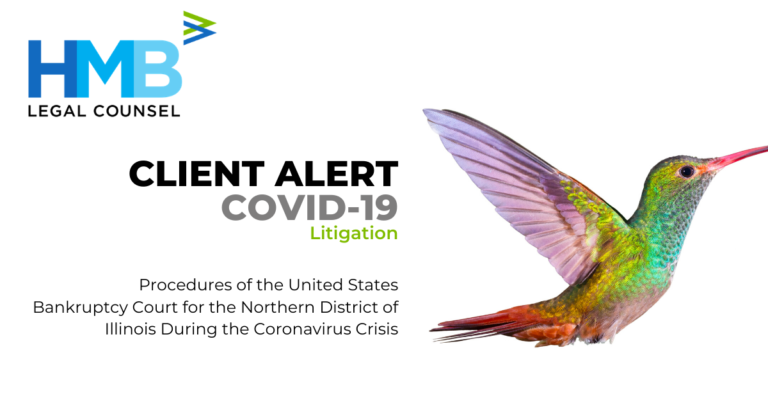Actions Taken by the Bankruptcy Court
The COVID-19 pandemic notwithstanding, the United States Bankruptcy Court for the Northern District of Illinois remains open for business, although not business as usual. Recognizing the need to maintain social distancing, the Court has made several significant changes to its daily operations.
After two months of hearing routine motions telephonically, the Court has implemented procedures to conduct more substantive hearings. In its latest move to keep functioning during this unprecedented crisis, starting June 1, 2020, the Court will hold trials and evidentiary hearings on the Zoom for Government platform. The Court has posted a Model Pretrial Order for video trials on its website, which may be modified at the presiding judge’s discretion.
The Bankruptcy Court continues to require telephonic appearances for its other motions, via CourtSolutions, for all parties, with personal appearances only permitted by a judge’s order. Any person entering the courthouse must wear a face mask or covering. Local Rule 9013-1(E)(1) remains suspended to allow motions to proceed without personal appearances.
The court calendars remain modified to prevent overlapping hearings, and the requirement for original debtor signatures remains suspended.
A minimum of seven days’ notice is required for all motions, regardless of the method of service. Motions are now required to inform parties that a Notice of Objection, which does not need to include any basis for the objection, must be filed at least two business days before the hearing. If no Notice of Objection is filed, the Court may grant the motions without a hearing.
Currently, the Eastern Division (Chicago) has continued all in-person Chapter 7, 12 and 13 section 341 meetings until July 10. Chapter 7 debtors may have their meetings conducted telephonically, so long as their identity is verified by submitting appropriate documentation to the trustee. The Court will modify this notice after July 2, 2020.
The Bankruptcy Court has adopted Amended Interim Bankruptcy Rule 1020, which memorializes changes to the Small Business Reorganization Act of 2019, as amended by the Coronavirus, Relief, and Economic Security Act, effective March 27, 2020. This rule increases the qualifying debt limit for small businesses to seek relief under the newly created subchapter V to chapter 11 from $2.7 million to $7.5 million. This amended rule opens this new form of bankruptcy to a significantly more sizeable number of distressed businesses.
What Does that Mean for My Case?
Although the landscape has significantly changed, all bankruptcy cases are proceeding. HMB Legal Counsel will continue to provide updates as the situation evolves. The ongoing issues related to the spread of the Coronavirus (COVID-19) have had and will continue to have a significant impact on individuals, families, businesses and markets. Visit our collection of resources providing guidance during these fast-changing circumstances. Please reach out to your lead team member to answer specific questions.



